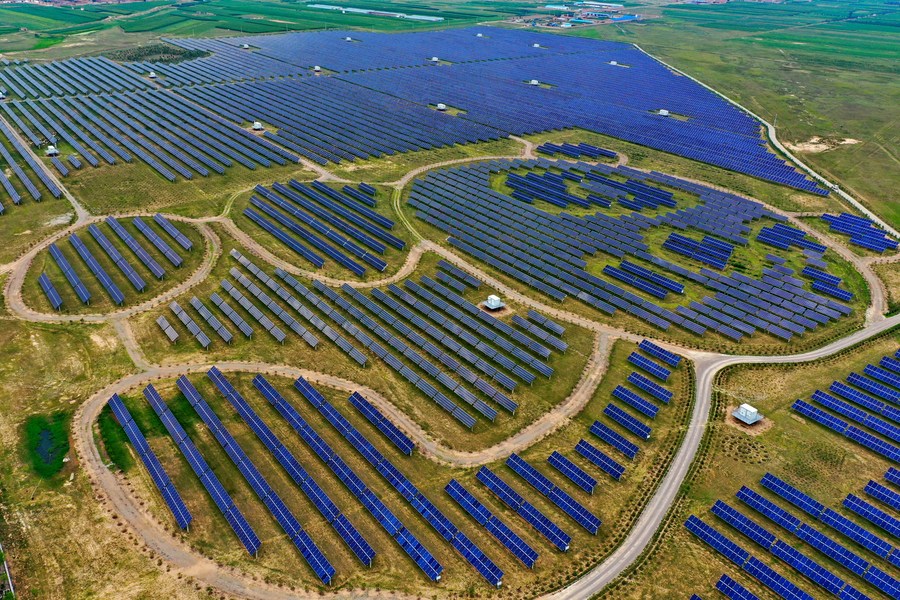One year on, China moving closer to carbon neutrality

Aerial photo taken on Aug. 3, 2021 shows a photovoltaic power station in Yunzhou District of Datong City, north China's Shanxi Province. (Xinhua/Cao Yang)
BEIJING, Sept. 22 (Xinhua) -- Exactly one year ago, China announced that it would strive to peak carbon dioxide emissions by 2030 and achieve carbon neutrality by 2060. Over 100 countries and regions have subsequently released their goals or visions of carbon neutrality, following the EU and China.
In the meantime, the energy consumption structure in the country has also undergone a transformation over the past year.
"The international consensus on carbon neutrality has accelerated the shift of global energy from resource dependence to technology dependence," said Li Junfeng, director of the National Center for Climate Change Strategy and International Cooperation.
China's energy transformation needs to complete the policy shift from "controlling total energy consumption" to "controlling total fossil energy consumption" as soon as possible, building an electric power system with new energy as the main body, and forming an institutional guarantee to promote low-carbon energy transformation, Li added.
Beijing, the Chinese capital, is leading the shift.
"The city's carbon emissions peaked at about 135.8 million tonnes in 2012, excluding aviation kerosene, and have generally declined since then," said Tong Deliang, a senior engineer with the Beijing Municipal Institute of City Planning and Design.
Thanks to Beijing's continuous energy structure optimization, industrial adjustment and the redistribution of non-capital functions to other areas, the city has basically established a diversified, clean and efficient modern energy system covering urban and rural areas, and has become a model city for clean energy transformation in China, according to Tong.
The coal consumption in Beijing has been greatly reduced from 11.65 million tonnes in 2015 to about 1.35 million tonnes in 2020, with coal's contribution to the city's energy-consumption mix dropping from 13.1 percent to 1.5 percent, said Zhao Xiaowei from the energy department of Beijing Municipal Commission of Development and Reform.
In 2020, Beijing's energy consumption per unit GDP was 210 kg of standard coal per 10,000 yuan (about 1,540 U.S. dollars), down 24 percent from 2015, Zhao said.
Since the pilot carbon market was launched in 2013, Beijing's carbon trading has been active, with carbon quota prices rising steadily. Among the seven pilot carbon markets in China, Beijing's carbon price is the highest. The cumulative trading volume of carbon quotas is 42.86 million tonnes, with a turnover of more than 1.8 billion yuan.
Looking ahead, Beijing needs to deepen reform of the energy pricing mechanism, improve green and low-carbon fiscal, tax and financial policies, innovate a market-based development mechanism for green energy, and actively carry out international exchanges and cooperation, Zhao said.
In fact, China's planning for carbon neutrality started as early as the beginning of this century. Since 2006, China has implemented stringent controls on energy, reversing the trend of rapid growth in energy consumption and carbon dioxide emissions. Since 2010, China's coal consumption and carbon dioxide emissions have basically achieved zero growth.
China advocated an energy revolution in 2014, announcing that it would gradually get rid of its dependence on fossil energy, especially its high dependence on coal, and proposing to build a clean, low-carbon, safe and efficient energy system.
"All these long-term plans have laid a solid foundation for achieving carbon peak and carbon neutrality in the future," Li said.
Photos
 Bumper harvest presents a magnificent scene of terraced rice paddies in SW China's Luzhou city
Bumper harvest presents a magnificent scene of terraced rice paddies in SW China's Luzhou city In pics: life of Siberian tigers in NE China's breeding center
In pics: life of Siberian tigers in NE China's breeding center Explore wonderland created by an alpine lake cluster in SW China's Yunnan
Explore wonderland created by an alpine lake cluster in SW China's Yunnan In pics: Museums across China unveil creative and culturally-inspired mooncakes
In pics: Museums across China unveil creative and culturally-inspired mooncakes
Related Stories
- China's Zhongguancun Forum to highlight intelligence, health and carbon neutrality
- Carbon neutrality drives growth of China's investment cooperation
- China needs to improve carbon pricing mechanism: report
- Interview: China's quest for carbon neutrality boon to global green agenda, says UNEP official
- China's national carbon market starts online trading
Copyright © 2021 People's Daily Online. All Rights Reserved.






